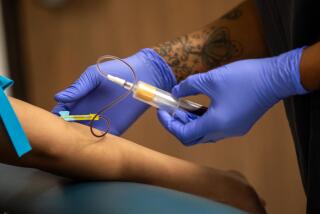Currently Required of Blood Donors : County to Offer Test for AIDS Virus
- Share via
The San Diego County Department of Health Services, in keeping with a new state law, will begin offering a controversial screening test for a virus that is associated with acquired immune deficiency syndrome, or AIDS.
Dr. Donald Ramras, the county’s public health officer, said he expects the free tests will be available upon request by the end of the month at the main county health center on Pacific Highway, and at other centers still to be determined. Anyone who wants the test for any reason can request it, but health workers who treat AIDS patients advise against it, and Ramras said he does not expect many people to request it.
AIDS is an incurable disease that causes the body’s immune system to break down and often leads to death. It is transmitted by intimate sexual contact or through a blood transfusion. Homosexual males, hemophiliacs and users of intravenous drugs are among the high-risk groups, but the disease is also spreading among the general population.
Currently, all blood donors are required by state law to first take the test, called the HTLV-III/LAV antibody test, which is given at blood banks. Under a bill signed in April by Gov. George Deukmejian, the state health department must order counties to establish other sites for administering the test. This is being done to discourage people who fear they may have the disease from using the blood banks simply for health screening.
Some health officials feared that inaccurate test results at blood banks might lead to donations of contaminated blood.
Many gay community groups and health workers who treat AIDS victims have opposed both the law and the blood test. They say the test is inconclusive and fear that the results may not be kept confidential, as is required by law.
“We don’t recommend the test be taken,” said Tom Jefferson, a staff member of the San Diego AIDS Project, a counseling group for victims of AIDS.
“Even if the test is positive, it doesn’t mean the person has AIDS, is going to get AIDS or is carrying AIDS. It’s a real problem. And what does one do after a positive result from a test? You’re left hanging out there on a limb.”
Ramras said the test is usually accurate in determining whether the person has antibodies to the virus associated with AIDS, which would indicate that he has been exposed to the disease. A person could be exposed to the virus but never come down with AIDS, Ramras said. He also expressed reservations about the test’s conclusions.
“This test does not tell you whether you have AIDS,” he said. “It does not tell you whether you have the virus in your body. At best, it tells you whether you have antibodies to the virus. At worst, it falsely tells you that you have antibodies when you don’t, thereby falsely scaring you, or it tells you you don’t have them when you do, thereby falsely reassuring you.” “I would think most people will not want to take the test just for their own edification,” Ramras said. He said he expects only about four to 10 people a week to ask for it, but added, “if there are more, we’ll handle them.”
Ramras said his staff is being trained in pre-test and post-test counseling, and that his office is awaiting the state forms needed before the test can be given.
Dr. Hal Frank, director of the AIDS Project, said he believes the county is underestimating the number of people who will ask for the test, and that the county is ill-prepared to counsel people who get positive results.
Ramras said his staff will tell people what is known about what the results do and don’t mean, and will give them a list of doctors and mental health clinics that treat AIDS victims.
“There’s no question we’re not prepared to give detailed psychiatric help to people who take the tests, but we are prepared to commit the resources we have available,” Ramras said. “If thousands of people turn out for the test and thousands of people have mental health needs, they would swarm our mental health system and groups like the AIDS Project, but I don’t know that yet. Time will tell.”
Jefferson said gays and some health workers also fear that the confidentiality of the test will not be respected.
“They have made some good efforts, but when it gets down to it . . . It’s like driver’s license information is supposed to be confidential too, but the insurance companies get it,” he said.
He said that 150 AIDS victims have sought assistance from the AIDS Project since 1981 and that 80 of those have died. He said that according to county statistics, there have been only 91 cases of AIDS with 42 deaths.
The discrepancy in figures is because the county, in order to avoid counting some people twice, only counts cases where the victim was a resident of the county at the time symptoms first appeared, whereas the project counts all cases that are seen in San Diego, even if the victim first experienced symptoms while living in another area.
More to Read
Sign up for Essential California
The most important California stories and recommendations in your inbox every morning.
You may occasionally receive promotional content from the Los Angeles Times.













